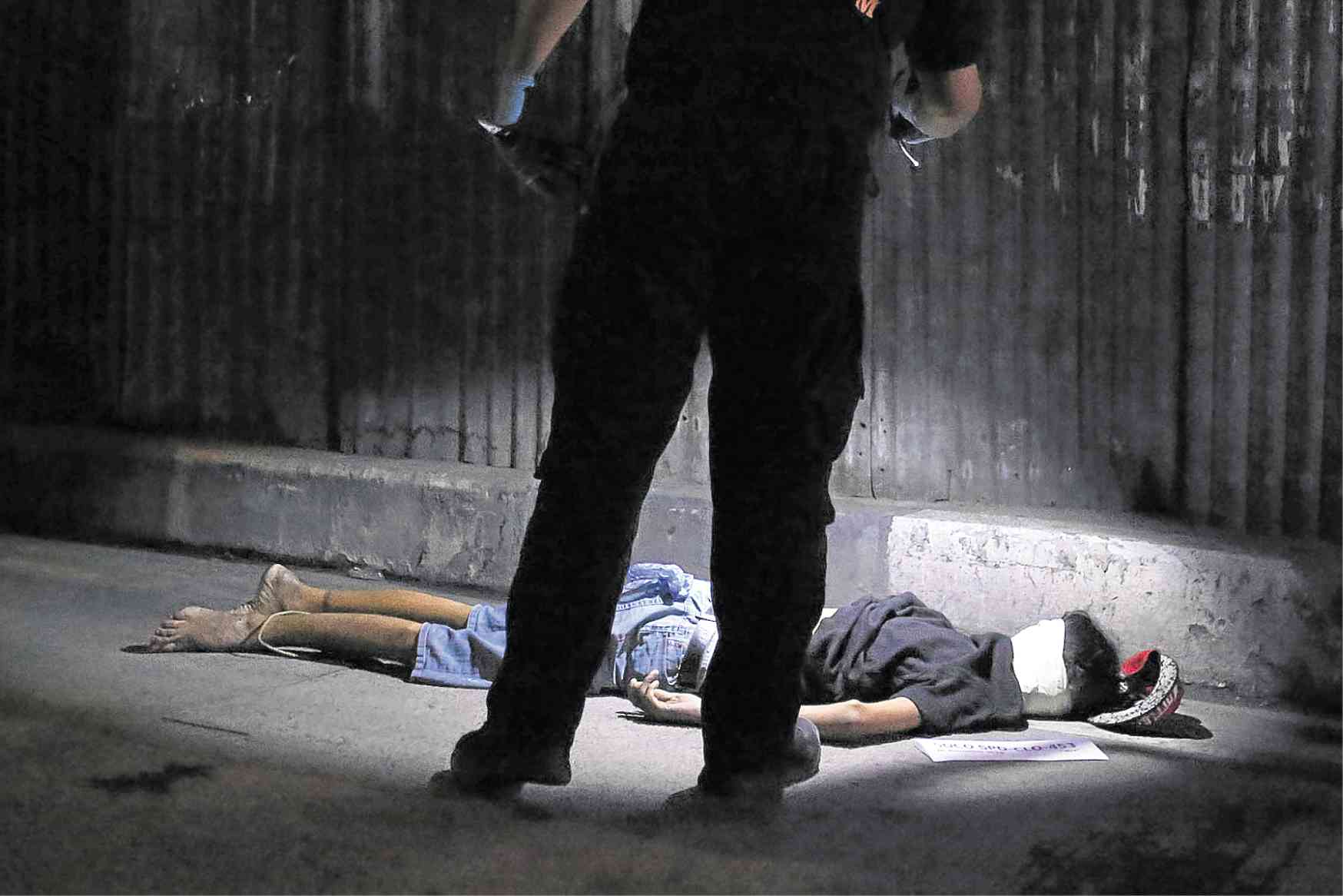
FILE PHOTO: Human rights advocates who see the drug war as President Rodrigo Duterte’s chief instrument of control see no end to scenes like this. – The “drug war” reward system under the Duterte administration did exist based on pieces of evidence presented before the House quad committee probing into extrajudicial killings. INQUIRER/RAFFY LERMA
MANILA, Philippines — The “drug war” reward system under the Duterte administration did exist, leaders of the House quad committee said, citing pieces of evidence presented during their probe into extrajudicial killings.
Key officials of the four House panels noted that documentation and testimonies during their investigation show a clear picture of a reward system for police officers who killed suspects under the war on drugs of then-President Rodrigo Duterte.
In a joint statement on Tuesday, three of the four quad committee chairpersons — Surigao del Norte 2nd District Rep. Robert Ace Barbers, Santa Rosa Rep. Dan Fernandez, and Manila 6th District Rep. Bienvenido Abante Jr. — disputed the statements of Duterte allies, Senators Ronald dela Rosa and Bong Go, who both said that the drug war reward system was inexistent.
Dela Rosa was the top boss of the Philippine National Police, while Go, a long-time aide of Duterte, served as a Cabinet official during the previous administration, which made the drug war one of its legacy programs.
According to Fernandez, the revelations of former police colonel Royina Garma — who is believed to be close to Duterte — indicate that the reward system was carried out from the upper echelon of the government to police officers on the field.
“The evidence so far unearthed in the Quad Comm belies Senators Bato’s and Bong Go’s denials of EJK involvement and existence of the reward system that was public knowledge during the previous administration, particularly in the Philippine National Police (PNP),” said Fernandez, chair of the House committee on public order and safety.
“Not only did it exist; it was managed by higher-ups, meaning by Malacañang (Duterte administration),” he added.
Fernandez emphasized that Garma was not the first to reveal that police officers who killed drug suspects were rewarded. He reminded the public that Police Col. Jovie Espenido said in the quad committee’s previous hearing that a former mayor told him that revenues from Philippine offshore gaming operators (Pogos), small town lottery (STLs), and intelligence funds were used to compensate police officers involved in drug war operations.
READ: Garma: Duterte rewarded cops for ‘drug war’ kills
Last Friday, Garma confirmed that the past administration adopted a “Davao template” for anti-drug campaign, where police officers involved in the killing of drug suspects were given bonuses.
Garma provided an affidavit wherein she said there are three modes of payment or rewards — first, for every suspect killed; second for the planned operations; and third, the refund of operational expenses.
According to Garma, it was Duterte who contacted her about the creation of a national task force. Afterwards, Garma admitted that she introduced former National Police Commission member Edilberto Leonardo — her upperclassman in the Philippine National Police Academy — to the former president.
Also, Garma said Leonardo contacted Go about the rewards that were passed down to police officers. In separate statements, Senators Ronald dela Rosa and Bong Go have denied knowing the drug war reward system during the Duterte administration.
Go on Saturday said he had no participation “in the operational requirements of the war on drugs.”
Barbers, nevertheless, said that the House quad committee would eventually uncover who was lying.
“Our impression is that the intelligence funds came from the Office of the President and the PNP. When these funds are audited, we will find out who is telling the truth or lying: Sen. Bato and Sen. Bong Go, or Garma and Espenido,” Barbers said.
Abante, meanwhile, pointed out that in the supposed 2016 discussions for the nationwide implementation of the Davao template, dela Rosa and Go were seen in Duterte’s meeting with senior police officers, including Garma and Leonardo.
“The Davao City EJK (extrajudicial killing) template and reward system was discussed during the meeting. A few weeks later, the assassination of drug suspects in police operations and by riding-in-tandem hired guns started. It is not difficult to connect the dots,” Abante said.
READ: Rewards of up to P1 million led to ‘narco-pol’ slays
Aside from the reward system, the House quad panel hearings have uncovered several incidents of alleged EJKs.
Some of these were the killing of three Chinese nationals in 2016 inside a Davao jail, supposedly carried out by two inmates contracted by police officers; the assassination of former Philippine Charity Sweepstakes Office board secretary Wesley Barayuga in July 2021; and the recent admission of former police colonel Royina Garma that a police officer she knew bragged about killing former Tanauan mayor Antonio Halili.
In the Chinese nationals’ case, self-confessed hitman Leopoldo Tan said a certain SPO4 Arthur Narsolis — his high school classmate — relayed to him the orders to kill the detained Chinese men. Tan said he heard Bureau of Corrections official Sr. Supt. Gerardo Padilla talking over the phone with Duterte — who congratulated the prison official for “a job well done.”
Padilla initially denied having knowledge of the hit but eventually admitted that he indeed talked to Duterte, who congratulated him.
On Barayuga’s slaying, Police Lt. Col. Santie Mendoza testified that Garma and Leonardo masterminded the killing of the PCSO official.